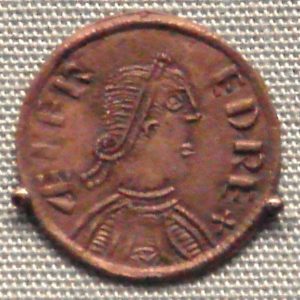Welcome to the article: interesting facts about Alfred the Great. I hope that you will enjoy reading about Alfred the great facts. First, let’s start with his background!

Who is Alfred the Great?
I would assume that people who end up in this page will know who this awesome king is, but for those who don’t know, I have included basic background information about Alfred the Great. He is known to most people as the King who won against the Viking invasion. He was the king of Wessex, which was an Anglo-Saxon empire in the South of England. He came to the throne in 871 without any notice when his brother died in a battle. In his reign, he fought against the Vikings and became famous for defeating the Vikings. His reign ended in 899.
Interesting Facts about Alfred the Great
1. Alfred the Great was the youngest of five sons.
You might say, why is that an interesting fact about Alfred the Great? If you think about it, it is very, very interesting. Usually, the oldest son inherits the throne, but Alfred the Great, the youngest, got the throne. Then, how did he get it? All of his brothers died, many of them in the battle against the Vikings. Alfred was lucky to survive and claimed the throne.
2. He might have forced his way to be the king.
When his brother died, the next in line was his older brother’s son, his nephew. However, scholars suggest that Alfred might have claimed himself to be the king after his brother died. Since he was a better general and has the endorsement from the pope, he would make a better king than his nephew.
3. When he was young, he was not interested in fighting.
Because he was the oldest of the five children, his prospect of being a king was very dim. Partially because of this reason, he was not raised to be a warrior. Of course, he received military training just like others who were born into a prestigious family, but there was no expectation of him to be a great warrior. Instead, his mother instilled in him a great love for learning, especially for poetry. Also, he was fascinated with Latin, probably because of his visits to Rome. His love for learning had great impacts on his reign, and you will see that in later Alfred the Great facts!
4. As soon as became a King, he fought the Vikings. The year 878 is an important date in this fighting.
When his brother died in a battle against the Vikings, Alfred had no time to mourn but had to fight the Vikings. It does not make sense that the Vikings would give time for him to mourn, but they would press their advantage to gain a victory. In 878, seven years after he became a king, Alfred the Great had to retreat to a swamp called Somerset. In here, he is remembered for burning a cake. If you do not know about this story, you can read about it here. That same year, he defeated Guthrum and even baptized him and his men.
5. After he defeated the Vikings, he prepared militarily and was prepared to repel the future Viking invasions.
One of the well-known facts about Alfred the Great was that he was a wise ruler. After defeating the Vikings, he did not become idle. Instead, he built fortresses and garrisons known as the “fortress Wessex.” Also, he updated their navy by bringing foreign talent, and also organized an army that can be called anytime, which is similar to America’s Minutemen. In 890s, the Vikings invaded again, but they could not defeat this fortress Wessex, a network of fortresses and garrisons.
6. He was only English monarch to be called “Great.”
Because of his accomplishments in saving England from Viking invasion, Alfred the Great is the only monarch in England to be called “Great.” This Alfred the Great fact says a lot about how much Englishmen respected this king.
7. His love of learning and military skills made him great.
There were plenty of other kings that were brilliant generals. What made Alfred the Great stand out was his love of learning and his effort to spread learning throughout the kingdom. He promoted the English language, recruited scholars from Europe, translated literature, etc. Because of his effort, Wessex transformed from an uncultured mob of people to educated citizens.
8. He is the only leader that had a biography.
There were zero Anglo-Saxon leaders that had a biography before Alfred, and zero after. His advisor wrote a biography of him, but Alfred did not endorse the work. It may have been possible that he did not know that it existed. Whatever the case is, he became the only leader in Anglo-Saxon history that has a biography. It is important because we can see detailed descriptions of his life.
9. He died in 899 in Westminister Cathedral.
There are two cathedrals in Westminster, the Old and the New. The old cathedral is where Alfred the Great was initially buried, and the new cathedral was started once he died. After it was finished, he was transferred to the new cathedral, and the kings after him were buried there too.
10. His son, Edward, became a good king also.
When he became king, Edward followed the footsteps of his father. He followed his policies, updated the military, and was successful against the Vikings. He expanded the land of Wessex, and by the time of Alfred’s grandson, the size of Wessex was essentially the size of the current day England.
I hope that you enjoyed these facts about Alfred the Great! If you want to know facts about other historical figures, visit the historical figures page!
